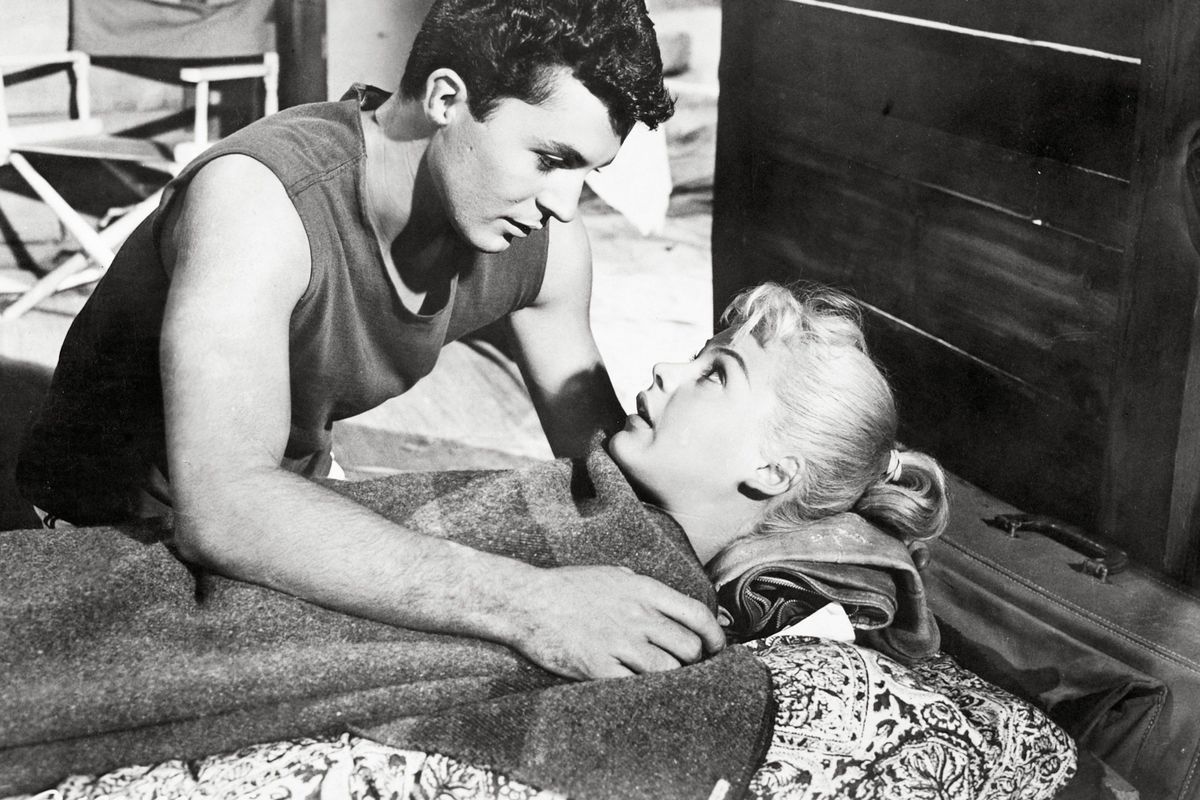James Darren, actor and singer of ‘Gidget’ teen idol fame, dies at 88
James Darren, left, and Sandra Dee in “Gidget,” in 1959. (Columbia Pictures)
James Darren, who found teen heartthrob fame as Moondoggie in the 1959 surfer film “Gidget” and whose scenes of sun-kissed beaches with star Sandra Dee helped launch the California surfing craze, died Sept. 2 at a hospital in Los Angeles. He was 88.
He had been diagnosed recently with an aortic valve problem, a statement on Darren’s website said.
Over more than five decades, Darren built an eclectic career that included hit songs with his silky baritone and films such as “The Guns of Navarone” (1961), in which he played a Greek anti-Nazi fighter alongside a star-filled cast that included Anthony Quinn and Gregory Peck. On television, he had recurring roles on shows such as the police drama “T.J. Hooker” as a veteran cop and the sci-fi series “Star Trek: Deep Space Nine,” playing holographic lounge singer Vic Fontaine.
Yet for many fans, he was forever the dark-haired surfer of “Gidget” who struggled over whether to leave for college or follow the king of the beach, the Big Kahuna (played by Cliff Robertson), to chase waves around the world. In the end, Moondoggie falls for the bright-eyed and pint-size Gidget, a portmanteau nickname of “girl” and “midget.”
The film – based on the novel “Gidget” by Frederick Kohner, modeled on his daughter – helped introduce the vibes, fashion and slang of surf culture that was later elevated by groups such as the Beach Boys and films including the 1966 documentary “The Endless Summer.”
“Surfing before Gidget already had a lot of momentum,” essayist Davis Jones wrote in Surfer magazine in 2017. “It was always going to be a thing. Still, Gidget meant ‘surfing’ to a lot of people the way John Travolta meant ‘disco’ after Saturday Night Fever.”
The origins of Moondoggie have conflicting accounts. A Malibu artist once used the name, and the character in Kohner’s book is a surfer from a rich family. Darren said he felt the name reflected the character’s disposition. He “made love by the moon and he was a dog,” he told the Los Angeles Times in 2004. ( Darren also noted that Dee’s mother kept a tight leash on the actress during the filming in Malibu; she was 17 at the time, and Darren was in his mid-20s.)
“I was in love with Sandra,” Darren once said. “I thought that she was absolutely perfect as Gidget. She had tremendous charm.”
In the audition for the “Gidget” role, the directors said they were considering having the Moondoggie character lip-sync his songs. “But I told them I could sing,” Darren recounted. “We went into one of the soundstages with a piano player, and I sang the song and they said, ‘He can do it.’ ”
Darren released more than a dozen albums, which included “Presenting James Darren” (1958) with the title track to “Gidget.”
Dee left the Gidget role after the first film, but Darren – who described himself as a “prisoner” of a studio contract – was part of the two that followed: “Gidget Goes Hawaiian” in 1961 with Deborah Walley in the starring role, and “Gidget Goes to Rome” (1963) starring Cindy Carol. (“Gidget” also became a 1965-1966 television series that launched the career of actress Sally Field.)
Darren went on to play a semi-autobiographical part as a teen idol on two episodes of “The Donna Reed Show.” He also became an adjunct member of Hollywood’s Rat Pack, led by Frank Sinatra and Dean Martin, joining their late-night party hopping and becoming godfather to Nancy Sinatra’s daughter, AJ Lambert. Darren’s song stylings had some music reviewers drawing favorable comparisons to Frank Sinatra.
Darren’s “Goodbye Cruel World” (written by Gloria Shayne Baker) reached No. 3 on the Billboard Hot 100 in 1961 (an Italian version, “Addio Mondo Crudele,” was a hit in Italy), and “Her Royal Majesty” (by Carole King and Gerry Goffin) reached No. 6 on the Billboard chart in 1962.
Once at a television dance show in San Francisco in the early 1960s, a group of young women in the audience pushed through a door and yanked Darren onto the sidewalk.
“They started pulling hairs out of my head for souvenirs,” he recalled. “I was enjoying it – not the pain, but the adulation. The police rescued me and brought me up on the roof. And I’d look down from the roof and they would scream. That was fun.”
Darren was born James William Ercolani in Philadelphia on June 8, 1936, to parents who had emigrated from Italy. James dropped out of school at 16 in hopes of pursuing a career as a singer and actor – inspired by another Philadelphia native, Eddie Fisher.
“I wasn’t really a singer,” he said. “I was a kid in Philly whose dad would take him to bars and nightclubs and I would get up and sing two songs.”
While taking acting classes with Stella Adler, a prominent New York drama teacher, the secretary of a photography studio set up a meeting with a casting agent, Joyce Selznick, the niece of Hollywood producer David O. Selznick.
Darren showed up for the appointment. On the elevator with him was a woman.
“She kept staring at me. I never met her. She never met me. We got off at the same floor and walked to the same office. That was our meeting,” Darren recalled. “Joyce brought me over to Columbia Pictures about a week later and got me a contract there.”
As a sports car admirer, he picked a stage name after automotive designer Howard “Dutch” Darrin. “I just changed the ‘i’ to an ‘e,’ ” he said.
Darren made his film debut playing a teen drawn to gang life in the juvenile crime drama “Rumble on the Docks” (1956). He then appeared in a string of films including the 1957 military comedy “Operation Mad Ball,” starring Jack Lemmon and Ernie Kovacs, “Gunman’s Walk,” a 1958 western with Van Heflin and Tab Hunter, the 1960 social drama “Let No Man Write My Epitaph” as the son of a struggling mother (Shelley Winters), and the Charlton Heston melodrama “Diamond Head” (1962).
After the “Gidget” movies, Darren increasingly appeared in TV roles. He co-starred on the science fiction series “The Time Tunnel” (1966-1967) and later made guest star appearances on shows including “Love, American Style” and “Fantasy Island.” He also worked as a director on TV series including “Beverly Hills, 90210” and “Walker, Texas Ranger.”
In the 1970s and early 1980s, Darren was the straight man in a Las Vegas comedy act with Buddy Hackett. The act broke up when Darren began appearing in “T.J. Hooker” alongside William Shatner. In his final film role, Darren’s played a bar owner’s husband in “Lucky” (2017), a story of mortality in a small town, starring Harry Dean Stanton.
Darren’s first marriage, to Gloria Terlitsky, ended in divorce. In 1960, he married Evy Norlund, a former Miss Denmark, and they had two sons, Christian and Anthony. Other survivors include Jim Moret, a son from his first marriage; and five grandchildren.
Before filming “Gidget,” Darren had never been on a surfboard. He had to learn. More than four decades after the film’s release, he managed to hold on to some of the skills from his crash course in surfing.
“I can still stand on the board,” he told the Los Angeles Times, “and ride a small wave.”

